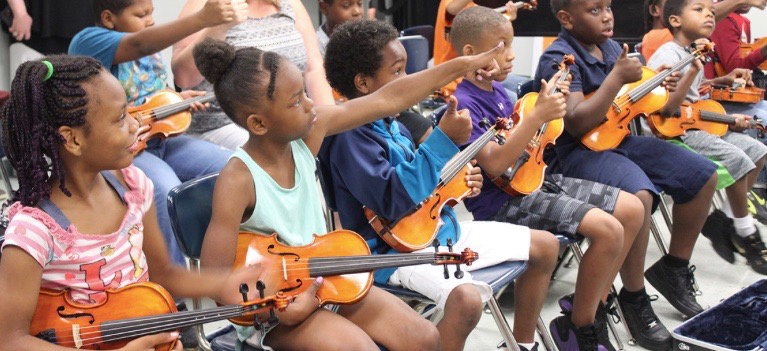By Harold C. Ford
The Flint Community Schools district has just concluded the first year of a critical three-year partnership imposed by the State of Michigan. The district will moves into the 2019-20 school year with a “balanced calendar” that has school starting for students Aug. 7 and with commitments to a program of staff training.
In addition, the district concluded its summer after what district officials described as a highly successful “Summer Scholars” enrichment program for several hundred students.
 Of significance, 2019-20 will be the second year in the superintendent’s office for Derrick Lopez, who signed a three-year contract with the school district in August 2018. At the district’s Board of Education meeting on July 15, Lopez announced commitment to several programs of professional development for FCS staff.
Of significance, 2019-20 will be the second year in the superintendent’s office for Derrick Lopez, who signed a three-year contract with the school district in August 2018. At the district’s Board of Education meeting on July 15, Lopez announced commitment to several programs of professional development for FCS staff.
State partnership:
The district starts the second year of the three-year mandated state partnership facing continuing requirements for improvement in three areas: increase attendance to 90 percent; improve test scores by 10 percent; reduce suspensions by 10 percent.
If the efforts fail, the district could face three possible consequences: being absorbed by another district; being reconstituted; or being shut down.
Little is known publicly so far about how Flint fared in meeting these goals in 2018-2019. However, information gleaned from various sources helps illustrate the challenges:
-
Attendance: In 2017-18, the percent of all students “chronically absent” (10 percent, or more, of school days) in Flint schools was 48 percent. For all 21 school districts in the Genesee Intermediate School District, the number of students “chronically absent” was 21.9 percent. For all districts in the state of Michigan, that number was 19.9 percent. (Sources: Michigan Department of Education/MDE; Genesee Intermediate School District/GISD; Ruth Mott Foundation/RMF. )
-
Test scores in reading: In 2017-18, 11.5 percent of Flint students demonstrated “reading proficiency.” In all GISD school districts, 38.9 percent demonstrated proficiency in reading. For all districts in Michigan, that number was 44.4 percent. (Sources: MDE; GISD; RMF.)
-
Test scores in math: In 2017-18, 12.4 percent of Flint students demonstrated “math proficiency.” In all GISD school districts, 39 percent demonstrated proficiency in math. For all districts in Michigan, that number was 45 percent. (Sources: MDE; GISD; RMF.)
- Suspensions: No recent suspension or expulsion data has been made available to the public by Flint schools. In 2018-19, FCS budgeted $651,566 for building/classroom management and security.
Balanced calendar:
A balanced calendar for Flint schools means students start the school year earlier (Aug. 7), end the school year later (June 18), and have more intersessions (breaks) in addition to traditional holiday breaks. Intersessions in the 2019-20 school year are scheduled for Sept. 16-20; Nov. 4-8; Feb. 18-21; April 6-9; and May 26-29.
As more and more school systems opt for balanced calendars, the jury is still out with regard to the advantages, disadvantages, and overall impact of a modified calendar such as the one Flint has adopted. A report by the Vancouver Board of Education, for example, arrived at the following conclusions, among others:
-
Pros: Advocates feel that “many aspects of learning improve in a year-round schedule, including student attendance, attitude, and academic achievement, and that teachers have greater job satisfaction … the balanced calendar can be highly effective in reducing school operating costs.”
-
Cons: Opponents argue “there is no substantial increase in academic student achievement … students, parents, and caretakers must deal with schedule challenges and adaptation to change … cost-saving claims are unsubstantiated.”
“Summer Scholars” program offered Flint students opportunity to learn through music, cooking, robotics, math

Students in the “Summer Scholars” program learn about the violin at the Flint Institute of Music (Photo by Bridgett Jones, FCS)
Other advantages cited in the Vancouver report included that a balanced calendar “eliminates the learning loss that takes place during the long summer break … benefits students identified as ‘at risk’ … students can make up a course, get remediation or enrichment during their vacation time through intersession classes.”
Such advantages were demonstrated through a five-week Summer Scholars Camp(s), June 24-July 25, overseen by the office of FCS Assistant Superintendent Anita Steward. Willing high school students were welcome, but the bulk of the summer programming was aimed at “at risk” students in grades K-8 as selected by building principals.
“We looked for some students who had some behavior issues as well as academic issues,” Steward said. Federal Title I funds were used to finance the summer camps.

Mason Bransford, entering 5th grade at Holmes STEM Academy, gets to lay down some licks at the Summer Scholars program (Photo by Bridgett Jones, FCS)
Fifty students in nine buildings, grades K-5, were targeted; 60 students each in grades 6, 7, and 8 were also targeted, for a total of 630. According to Steward, FCS had a waiting list at every grade level.
“Normally, our summer programming is held at the buildings,” said Steward. “This year we wanted to do something different. We wanted to make it fun while incorporating learning.”
Students rotated each week among four sites for the following activities:
-
Flint Institute of Music: Students received instruction in dance and music, both vocal and instrumental.
-
Mott Community College Culinary Arts Institute: “They were engaged in culinary arts in the morning and graphic arts in the afternoon,” said Steward. MCC’s Culinary Arts Institute opened in June.
-
Kettering University (KU): Camp Invention at KU focused on engineering projects. “They (were) engaged in building something so that they could deep sea dive,” said Steward. Actually, they needed to build a device that would retrieve an object from a water-filled pool. KU has long been supportive of robotics programs for students through its participation in FIRST (For Inspiration and Recognition of Science and Technology).
-
Baker College: At Baker College, students participated in The Algebra Project which, according to Steward, combines “hands-on learning with math.”
Literacy and math were incorporated at every site, Steward said. Further, sixth graders focused on activities designed to help them transition from elementary to middle school such as team building.
The short July 4 week allowed for field trips. Campers in grades 6-8 traveled to Oakland University, the Charles Wright African American Museum in Detroit, and the Twelve Oaks Mall in Novi where they participated in an academic scavenger hunt. Those in grades K-5 went to the Ann Arbor Hands-On Science Museum, the Ligon Outdoor Center in Clio, and the Potter Park Zoo in Lansing.
“What I experienced in my weekly visits to these sites was absolutely amazing,” Steward said. “The kids were engaged and learning.”
Staff training:
At the July 15 regular meeting of the board of education, Lopez announced commitments to five programs of professional development for FCS staff and partners. They included:
-
The Algebra Project: Inspired by civil rights activist Robert Moses, “It is about educating the children who are in the lowest quartile of mathematics,” Lopez reported.
-
Project Lead The Way: According to its website, PLTW “develops STEM (Science Technology Engineering Math) curricula for use by US elementary, middle and high schools.”
-
Success For All: Its website describes Success for All as a “standards-based Comprehensive School Reform curricula for early childhood through middle school.”
-
Adverse Childhood Experience: According to its website, ACE programming focuses on “traumatic events and experiences that occur early in life (that) have an impact on the health and social-emotional well-being throughout the lifespan (such as) death, abandonment, incarceration or divorce, and exposure to violence and substance use.”
-
Capturing Kids’ Hearts: Its website describes this program as “an immersive, participatory experience (where) teachers, staff, and administrators learn and practice skills they will use and model in their classrooms and districts.”
“Deep clean” of buildings:
District contracts for custodial and maintenance services that generated heated conversation at the board’s June meetings found further resolution at its July 15 meeting. Several board members balked at the prospect that all district buildings would not receive a “deep clean” prior to the start of school.
“We did hear the board loud and clear with respect to getting our buildings ready for the kids,” said Lopez. He announced “full cleanings” of all buildings before the start date of Aug. 7. “Our buildings have to be worthy of the kids.”
EVM Staff Writer Harold C. Ford can be reached at hcford1185@gmail.com.


You must be logged in to post a comment.